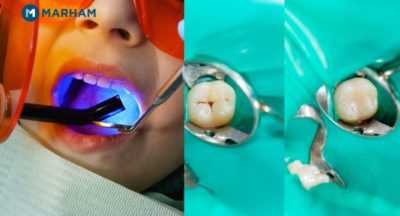Dental fillings are used to remove the decayed tooth tissue and fill the cavity with a filling material. The procedure to fill a cavity takes about 25-60 mins on average. The cavity-filling procedure can last longer subject to the type of filling material and other factors.
Highlights
- Dental fillings take 25-60 minutes to complete depending on the area and severity of the cavity, and the type of filling material.
- Silver amalgam and indirect tooth fillings take longer to complete as compared to other filling materials.
How long does it take to fill a cavity?
Dental cavity filling has several steps involved and the process on average takes about 25-60 mins to complete. A small cavity located at the front teeth enamel can be filled in about 25-30 min. Large or multiple cavities at the back teeth require local anesthesia and can be filled in about an hour.
The actual time to fill a cavity depends on the severity of the cavity, filling material, and placement location of the filling. The factors leading to the deviation from the average filling time include;
Factors affecting the time to fill a cavity?
- Size of the Cavity
The size of the cavity determines the time it takes to fill it. Larger and multiple cavities require more time for the dentist to fill them.
- Penetration of the cavity
The time to fill a cavity depends on the degree of penetration of the cavity into the layers of teeth. Enamel is the topmost layer of teeth followed by dentin and pulp. As the cavity progresses deeper in the layers, it takes longer for the dentist to remove the decay and fill the cavity.
- The severity of the cavity
Various types of cavities take variable time to fill them. The smooth cavities of the molars are easily treated by fluoride. The fissure cavities are deep grooves and require a sealant to seal the cavity. The root cavities take longer to fill as they spread deeper and faster.
Read Also: Can you remove black lines on teeth at home
- Type of Filling Material
The type of filling material also affects the time it takes to fill a cavity. Silver amalgam takes longer as they require additional tooth removal. Indirect fillings need impressions and they require additional visits to complete the filling process. These factors cause deviation from the average time taken to fill a dental cavity.
Also Read: How long do fillings last
Dental filling procedure
The procedure to fill a cavity involves various steps which are listed here;
Anesthesia: Local anesthesia is injected to numb the gums. The deeper cavities at the back teeth usually require anesthesia while small front cavities are easily removed by air-abrasion tool even without anesthesia.
Decayed tooth removal: The decayed tooth enamel is removed using a laser or a drill. The whole area is sterilized to prevent the spread of bacteria.
Filling material applied: Based on the location, severity, and size of the cavity, the filling material is selected such as silver amalgam, gold, or porcelain. For indirect fillings, the impression is taken for custom fabrication of the filling.
Polishing the filling: The teeth filling is sealed in place and the edges are made smooth. The fillings may also need polishing to match the color and texture of the natural teeth.
Aftercare: When the anesthesia wears off (if applied), the treated teeth may cause slight discomfort. Avoid chewy and hard-to-eat foods immediately after the procedure and brush regularly. The discomfort goes away on its own after 1-2 days.
Consulting a dentist is recommended for your dental cavities to know more about the teeth filling procedure.
FAQs
1. Is getting a cavity filled painful?
The cavity filling does not cause pain as it is mostly done under local anesthesia. You may feel a slight discomfort or pain that settles on its own after 1-2 days.
2. How long will 3 cavities take to fill?
A moderately sized dental filling takes about 30-40 mins to complete. For 3 cavities, you will require 1.5-2 hours until the process is completed.
3. Can you eat after a filling?
You can eat and drink right after the composite filling as it hardens immediately. For other types of fillings, it is recommended to avoid chewy foods and prefers drinking juices and milkshakes.

